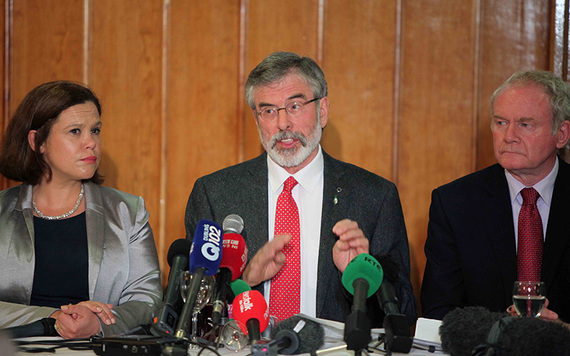With the Brexit negotiations finally underway in Brussels, Northern Ireland desperately needs a government right now to look after the interests of its people. But a government is something it does not have.
A hard Brexit, with the U.K. crashing out of both the Single Market and the Customs Union, would mean a hard border between the north and south of Ireland and have devastating consequences on both sides. Given the clueless start to the Brexit negotiations over the past two weeks which revealed the yawning gulf between the U.K. and the EU, that is now a real possibility.
Despite the pious concerns expressed by both the U.K. and the EU about the impact for Ireland north and south, it's very possible that all of Ireland will end up being collateral damage when the Brexit negotiations get nasty over the next year. If a hard Brexit does happen, Northern Ireland and the Republic will be hit harder than anyone else.
The Irish government is working hard to prepare, but what is the Northern Ireland government doing? Well, it's not doing anything at the moment because the power-sharing administration up there collapsed in January following the "cash for ash" scandal. Since then, efforts to get it going again have failed for various reasons, none of which has anything to do with the looming Brexit economic crisis.
Instead, the main reason right now is a row about the Irish language.
Yes, that's right, it's about what people in the south derisively call "the cupla focal" (Irish for a couple of words, which is all the Irish that most people here can speak).
It's hard to believe, but true. And it shows just how much Sinn Fein, the main driver of this argument in the North, is divorced from economic reality.
To put it simply, Sinn Fein is refusing to revive the Northern Executive because it wants the Irish language to be given equal status with English in the North. The DUP is not directly opposing this but is saying that if it does happen, equal status must also be given to the Ulster Scots language and customs that are part of the unionist tradition.
Read more: US students living their dream in ancient Irish village
The reality, measured by everyday use, is that both languages are as dead as the proverbial dodo.
It is true that there is a small but highly vocal group of Irish language enthusiasts in the North, just like there is in the south, who want Irish restored to what they see as its rightful place in everyday life. This means that everything from road signs to a dog license should be presented in both Irish and English.
All state business and documents should be accessible in both Irish and English. If you end up in court for not paying that dog license, you should be able to have your case heard in Irish. And so on.
In the south of Ireland, as you probably know, we have been paying lip service to the Irish language in this way since the foundation of the state. So, at least in theory, all dealings that people here have with the state can be conducted through Irish, or "the first official language" as the politicians call it.
The Irish language revival movement, you will remember from your history books, played a significant part in the independence struggle before and after the 1916 Rising. It was seen then and later as a way of awakening an Irish consciousness in the population, a sense of pride in our separate national identity and our nationhood.
So it became a central part of the education system in the new state in the south. Irish was (and still is) compulsory in all schools, and more hours are devoted to teaching Irish than any other subject.
The result of this compulsion over the decades was that generations of Irish kids grew to resent and even hate the Irish language which they saw as a waste of time. And in spite of having it forced down their necks throughout their school life, the vast majority were not able to speak more than a "cupla focal" a few years after leaving school.
Vast amounts of money have been spent on the attempt to resurrect the Irish language in the south over the decades, the Irish language TV station TG4 being just one example. But despite all this our everyday language remains English, and only a tiny section of the population can speak Irish with any fluency. (That does not stop people claiming on census forms to be Irish speakers, but the reality is exposed whenever people are faced with holding a conversation in Irish and after the "cupla focal" suddenly go dumb!)
Various other tactics were used, like making Irish a requirement for some university courses and for jobs in the civil service, and providing state grants for Irish organizations and for housing and industry in Gaeltacht areas where Irish was supposed to be the primary language.
But despite all this compulsion and the hundreds of millions spent over the years, Irish is effectively dead. We continue to pay lip service to it, but the "cupla focal" is as far as it goes for most people.
Of course there is a strong and vibrant Irish language movement here and that is to be admired. People should have the freedom to speak Irish if they wish.
There has been a growth of all-Irish schools (in which all subjects are taught through Irish). The movement gets lots of publicity, but the reality is that it's still a small minority and most people here have little ability and little interest in Irish.
As we said, all of this effort to promote Irish costs the state vast amounts of money every year, much of it in ways that are invisible. It makes little sense and it's hypocritical (like the "cupla focal" that our politicians insert into speeches), but it's what we do.
Read more: The best ways to learn the Irish language for free
Rather than honestly facing the truth about the Irish language, we observe the official line in case we might be seen as unpatriotic, or even a West Brit. You could say that it's our choice and that's okay, even though we're fooling ourselves. It's our money to waste, after all.
But the North is different, not least because half the population up there (the unionists) have no connection or identity with the Irish language whatsoever. So to spend vast amounts of money there on giving Irish "equal status" with the language that everyone actually speaks every day, English, is more difficult to justify.
There is also the question of who pays the piper. The Northern Ireland economy is still a disaster zone which is kept afloat by a massive funding transfer (up to £10 billion a year) from Westminster.
Does the British taxpayer want to spend millions indulging what they might see as the whims of Sinn Fein and its campaign for "equal status" in the North for the Irish language?

President of Sinn Fein Gerry Adams.
Exactly how much it would cost is far from clear. The DUP have said it could cost £100 million a year. One Irish language organization has put the likely bill at around £20 million a year.
It very much depends on how extensive it is across state services and how quickly it is implemented. A small army of translators might be needed in courts, public hospitals, police stations, post offices, etc.
If every road sign has to be in both Irish and English, who will pay when unionists keep painting over the Irish names? And if all road signs have to have Irish, why not Polish as well? As the DUP has pointed out, there are more Polish speakers in the North than people who speak Irish as their everyday language.
The figures for those who can speak Irish are probably even more unreliable in the North than they are in the south, because nationalists up there see it as a handy way of winding up the unionists. How many of them really can speak Irish fluently is doubtful and, like in the south, there is probably a lot of fudging going on.
In the 2011 census in the North, 11 percent of the population claimed to have "some ability in Irish" but less than four percent answered that they could "speak, read, write and understand Irish." And even that small number is likely to be a serious overstatement of the reality.
Despite this, there are some grounds for the Sinn Fein position. Both Scotland and Wales have legislation to protect their minority languages (although in Wales many people genuinely do speak Welsh every day), and a lot of money is spent by the British government supporting this (over £100 million a year in Wales). And in the 2006 St. Andrews Agreement which set the parameters for devolution in the North, there was a commitment by the British government to introduce an Irish Language Act.
This was part of the efforts to ensure equality under a Northern Ireland Executive but, like some other commitments, it was never introduced. Other things took precedence, but it is also true that unionist foot-dragging on the equality agenda was a serious problem.
It is because of that lack of equality for nationalists or parity of esteem, as they see it, that Sinn Fein is now making a big issue of the Irish Language Act. Or so they say.
We all know Gerry Adams is a great man for the "cupla focal," but the fact is that Sinn Fein did nothing much about it during their years of power-sharing, despite pressure from the Irish language lobby in the North. And one wonders how much the ordinary Sinn Fein supporters really care about the Irish language.
Looking at the stand-off in the North now, it's hard to escape the conclusion that this row is more about Sinn Fein adopting a position for its own reasons. It's probably less about parity of esteem and more about rubbing unionist noses in the smelly stuff.
None of it would matter that much except that the Brexit train is coming down the tracks at high speed and could well be out of control. And the people of Northern Ireland have no power-sharing administration to look after their common interests at this critical time.
Ta se dochreidte. Which, as all you fluent Irish speaking Shinners know, means it’s unbelievable.
Read more: No return to hard borders says NI Secretary of State James Brokenshire




Comments